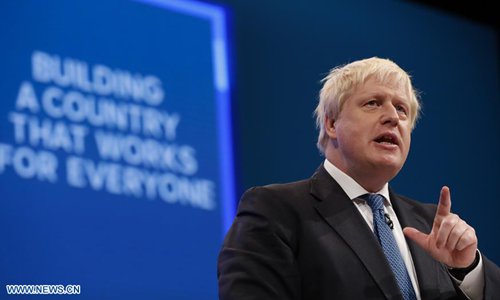
It came as no surprise - Boris Johnson, former foreign secretary of the UK, was elected leader of the country's ruling Conservative Party Tuesday and took over from Theresa May Wednesday to become Britain's new Prime Minister.
What his China policy will look like is of concern to many Chinese observers. Given his notable tough stance on foreign policies, Johnson may not be friendlier than his two predecessors - David Cameron, whose government coined the notion golden era of China-UK relations, and May, who continued Cameron's cooperative attitude with China.
Take the Hong Kong issue. On July 1, British Foreign Secretary Jeremy Hunt pointed an accusing finger at China over the recent protests in the city, stressing "UK support for Hong Kong and its freedoms" as rioters there not only attacked police but also besieged government agencies.
Great Britain, which is now facing tough challenges, still cherishes the memories of its past, when large swathes of the globe were part of the British Empire. When it comes to Hong Kong, some Britons do not have a clear understanding of the current situation in the city. Keeping these two factors in mind, there are always politicians in the UK who tend to make irresponsible remarks about Hong Kong. Hunt's words do not just represent himself, but also a movement which shares his mind-set, in Britain.
After China articulated its resolute attitude over the issue, the UK exercised restraint. There is no guarantee that Johnson won't be critical of the Hong Kong issue after becoming the new master of 10 Downing Street. But his recognition of the two countries' strengths, as well as the big picture of their future cooperation, should help him make rational decisions on Britain's China policy. Such an understanding should also make him think twice before he openly offends China over Hong Kong.
London is one of the most loyal allies of Washington. Not to mention before Johnson was elected, US President Donald Trump made no secret of his support for him. Johnson might cooperate with the US in certain Washington-initiated moves. How China-UK ties develop will be to some extent influenced by China-US relations.
Take the escalating tensions with Iran. The UK once opposed Trump for the latter's unilateral withdrawal from the Iran nuclear deal and sanctions against Tehran. But the UK's relations with Iran are now on a downward spiral following the oil tanker crisis. The US must be working behind the scenes on this. But setting the US factor aside, China is the UK's second largest trading partner outside the EU. Trade volume between the two countries had reached $86.2 billion annually as of February 2019. From this perspective, Britain is unlikely to deliberately provoke China in any way.
What the UK is focused on now is not whether to divorce the EU, but about a hard or soft Brexit. In his victory speech, Johnson promised, "We are going to get Brexit done on October 31." But the question is how? Divergences within his party will be his biggest obstacle going forward. On the matter of bridging the divide in his party and his future administration, Johnson won't have many comfortable days at 10 Downing Street.
If the UK really leaves the EU, attracting foreign investment and expanding its domestic market will be a must for the country, and China will play a crucial role. By then, British people will need to adopt a more open attitude toward China in establishing free trade zones, boosting bilateral trade and attracting investment and overseas students.
The UK's ties with China will indeed be impacted by the Beijing-Washington relationship, but London will not follow the US lead on everything. As a matter of fact, the UK tends to surprise people. It was the first Western country to join the China-initiated Asian Infrastructure Investment Bank. The country also launched its first 5G network in May while the BBC did two live TV broadcasts using China's tech giant Huawei's equipment on the same day, after Washington launched an aggressive campaign to prevent countries worldwide from using Huawei equipment.
During both Cameron's and May's administrations, the UK stated many times that Britain is a "natural partner" of the China-proposed Belt and Road Initiative. It can be argued that the UK has been, and will be, increasingly reliant on China economically.
The term China-UK golden era 2.0 has been used lately. It is believed that further strengthening of the golden era relationship is desired by both sides and Johnson will adopt a pragmatic attitude toward China. Compared with his predecessors, he is a tough diplomat, but he has never done anything to hurt relations with Beijing. In addition, as a realistic politician, any policy adjustment is possible on his watch.
*This article was first published on Global Times: http://www.globaltimes.cn/content/1159063.shtml
—————————————————————
FOCUS ON CONTEMPORARY NEEDS.
Should you have any questions, please contact us at public@taiheglobal.org